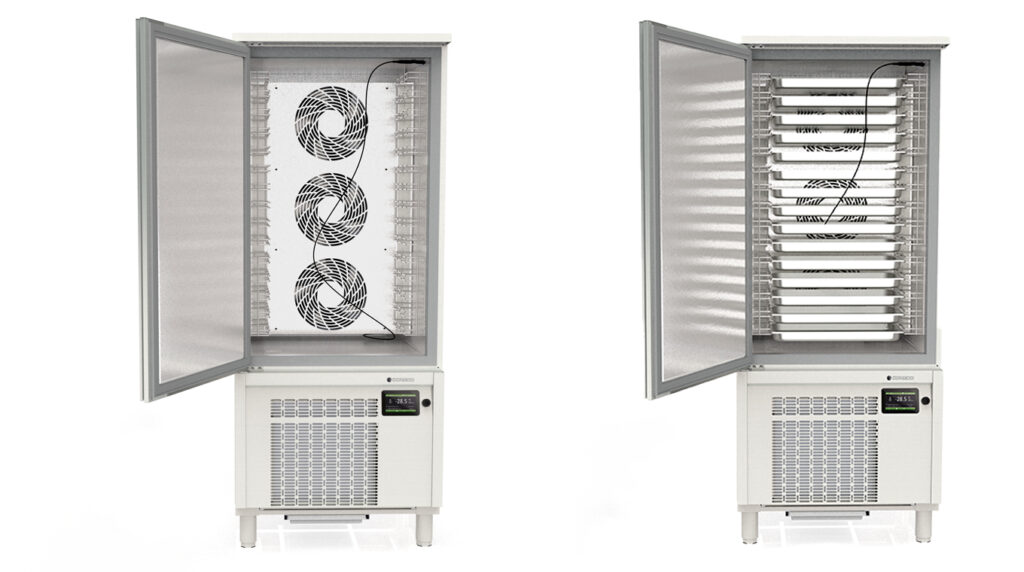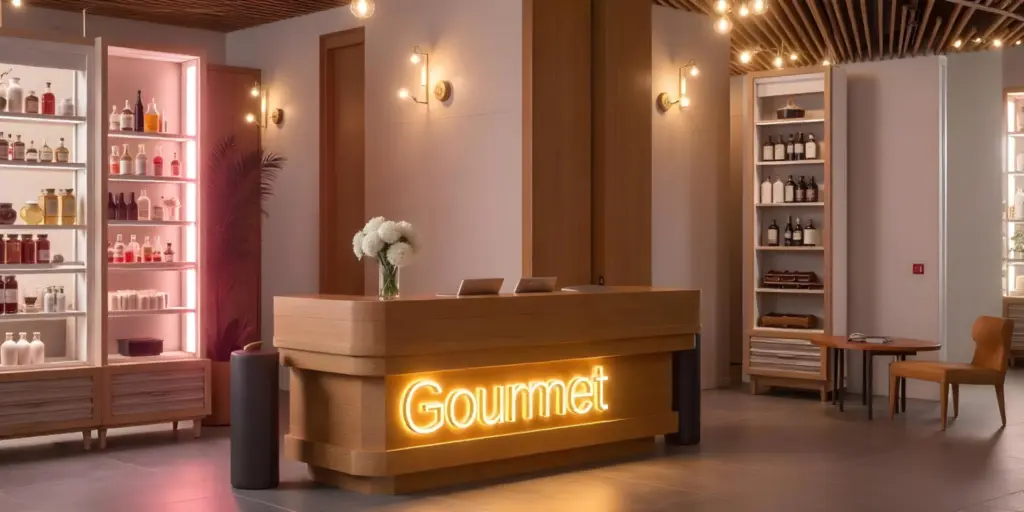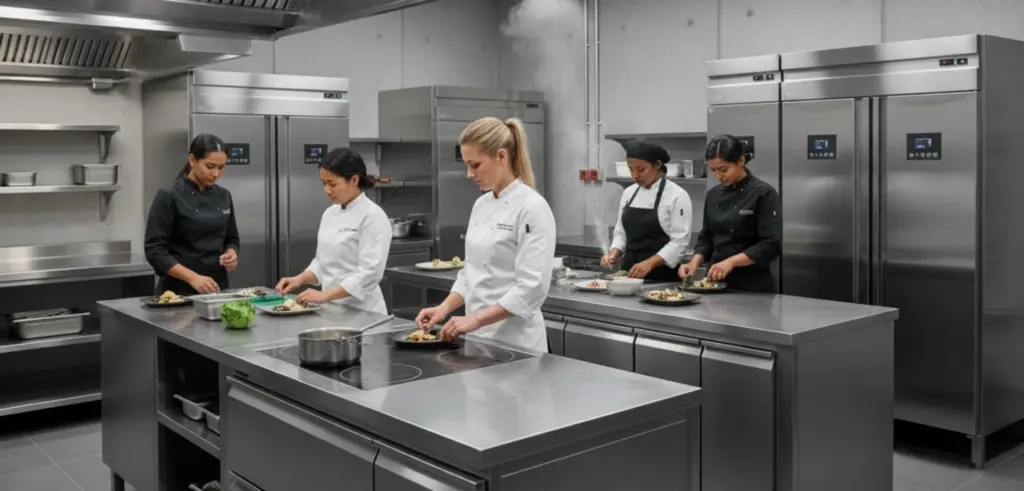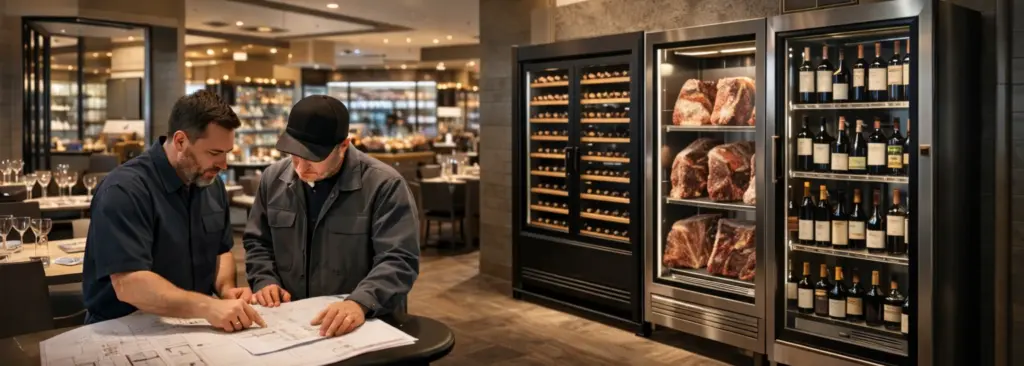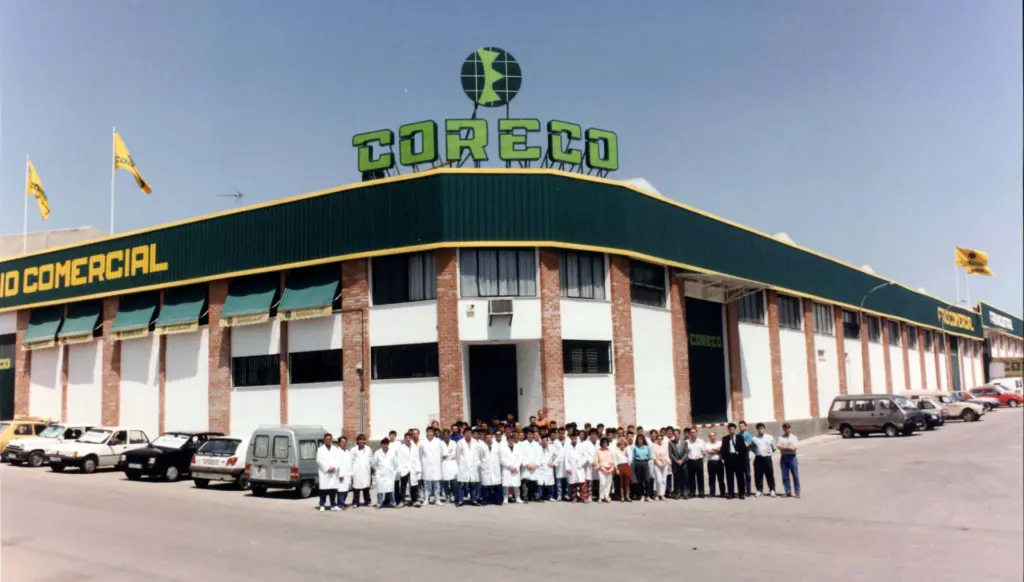For decades, industrial refrigeration was perceived as a functional, invisible and purely technical element. Its role was limited to preserving, cooling, conserving. However, the gourmet market, more demanding than ever in terms of quality, sustainability and customer experience, has completely transformed this perception and has given way to premium industrial refrigeration ranges.
Today, industrial refrigeration is not only part of the logistical operation of a professional kitchen: is a strategic tool that communicates, excites and sells.. It is a form of engineering applied to taste. A key piece in the narrative of modern gastronomic luxury.
This article takes a closer look at how design, technology and performance converge in the latest generation of premium industrial refrigeration equipment and how they can become differential sales arguments for distributors, sales engineers and decision-makers in the Horeca sector.
How has industrial refrigeration evolved? From out of sight to in the spotlight
The cultural and aesthetic change that the hospitality industry has undergone in the last decade has made open kitchens, visible processes and operational transparency a requirement. Today's customers want to know what they are eating, how the product has been treated and who is behind each decision.
Studies such as the one published in the International Journal of Retail & Distribution Management confirm that the visible design of refrigeration equipment directly influences the perception of quality, customer service time and point-of-sale conversion..
In this context, cooling equipment is no longer hidden in a secondary room. They are shownare integrated in the visible space of the restaurant or gourmet shop. Son already a part of the gastronomic scenography.
This change is not minor. It involves redesigning standards. Equipment such as the meat maturation cabinets DAV-400 or the refrigerated wine coolers DAW-200 from Coreco Gourmet have been developed not only to guarantee thermal performance, but also to integrate visually in environments of high aesthetic value, such as restaurant halls, tasting areas or gourmet corners.
LED lighting, triple-chamber glazing, professionally finished stainless steel and minimalist profiles allow premium industrial refrigeration equipment to be an active part of the customer experience. Because what you see, you value. And what you value, you pay for.
Flavour engineering: the new luxury is within
But the design is seductive at first glance, it is engineering that underpins the promise of quality. And in the case of premium industrial refrigeration for gourmet kitchens, that engineering translates into thermal control, relative humidity, ventilation, air distribution, energy efficiency and microbiological stability.
An exceptional example of this engineering applied to flavour is the system Master Ageing Controllerexclusive to Coreco and featured in its Dry Aged range of maturation cabinets. This controller accurately manages up to seven critical variables to ensure uniform and safe maturation of the product:
- Temperature
- Relative humidity
- Ventilation speed
- Exposure time
- Oxygen level
- Airflow
- Internal gas monitoring
This level of precision reduces shrinkage to remarkably low values (below 10% under controlled conditions) and results in more tender, tastier and more profitable meat. The Master Ageing Controller not a technological extrais the heart of a gastronomic precision tool.
🔗 Find out more about the Master Ageing Controller and how it optimises maturation.
This technology makes industrial refrigeration a premium product, an ally of the chef. Just another part of the chef's mise en place. Because in the modern gourmet kitchen, Every degree counts. Every variable adds up. And every visible process adds value.
What is the value of aesthetics, design and functionality in premium industrial refrigeration?
Aesthetics is no longer a whim. It is an element of differentiation. Visible refrigeration equipment should be aligned with the visual identity of the establishment. It must speak the same language as the brand. It must accompany the sensory narrative.
This can only be achieved when the design is intended for professional use. Coreco Gourmet cabinets, both for maturing and display, are built with highly durable and easy to maintain materials:
- AISI-304 stainless steel with rounded edges
- Triple-chambered glass with low-emission coating
- Automatic locking systems with deep-drawn profiles
- LED lighting tuned to enhance product colour and texture
- Opening and loading ergonomics designed for continuous use
Teams such as the DAV-400 or the DAV-200 not only meet the highest technical standards, but can also be integrated into customer service areas without disrupting the visual harmony of the premises.
Design is not what you see. It is what makes it possible to show what matters. And in the gourmet sector, that means taste, origin and care.
Visible sustainability: energy efficiency as part of luxury
In today's Horeca segment, luxury must also be sustainable. Energy efficiency, the use of green gases and a low carbon footprint are not just technical arguments, are commitments that the end customer recognises and values..
Coreco Gourmet has developed its range in compliance with the regulation F-Gas 2024which bans the use of refrigerants with high global warming potential. All its equipment uses natural refrigerants such as R290 and R600awhich guarantee:
- Reduction of harmful emissions
- Lower electricity consumption (with potential savings of up to 55%)
- Compatibility with corporate environmental sustainability policies
👉 You can read about how the F-Gas regulation affects the sector in this reference article:
🔗 The industrial refrigeration industry facing change. F-Gas Regulation 2024 by 2025
When cold becomes part of the commitment to the planet, also becomes part of the brand storytelling.
When design helps to sell more (yes, literally)
Well-designed premium industrial refrigeration equipment not only preserves, but also attract, justify prices and raise the average ticket price.. Especially in direct-to-consumer environments (restaurants, gourmet butchers, speciality shops), a visible and attractive cabinet generates conversation, content, interest and desire to buy.
Many establishments have managed to position themselves as "temples of taste" thanks to the visible presence of their ripening or display equipment. Because the customer does not only want to eat well: he wants to to see that the product has been treated with precision, patience and respect.
A cupboard in the dining room, illuminated and with a cut of meat maturing, sells by itself. And it justifies the price of the ration without the need for technical explanations.
Recommendations for distributors and technical sales representatives
Selling professional refrigeration to the high-end Horeca channel requires a combination of technical knowledge, commercial sensitivity and storytelling skills. Here are some practical keys to improve your sales pitch to different buyer profiles:
For independent or family restaurants:
- Connect with the end customer experienceWhat will the diner see when he or she enters, and how do you justify that €48 dish?
- Use design as a differentiating factor.This team is going to be part of your charter. Literally."
- It speaks in terms of cost-effectiveness and efficiency: reduction of shrinkage, lower consumption, increase of the average ticket.
For restaurant chains or groups with an international presence:
- Emphasises standardisation and quality controlThis team guarantees you the same result in any country.
- Focus on sustainability and complianceF-Gas, ISO, natural refrigerants.
- Argue with figures and return on investment: provides comparisons of consumption, amortisation and maintenance.
Key consultative selling techniques:
- Listen before you speakThe customer's value of efficiency, design, standards or user experience is detected.
- Turn every feature into a personalised benefittriple glazing → better visibility of the product, no condensation.
- Uses applied storytellingA customer of yours might post a picture of this cupboard on their networks before they even eat".
- Prepare visual materials: photos in the room, videos of use, technical data sheets in PDF or 3D.
Industrial refrigeration is no longer sold with closed catalogues. It is sold with branding projects, experience spaces and tailor-made arguments.
🚫 Common mistakes when purchasing industrial refrigeration without thinking about design
Many businesses become unprofitable before they even open their doors. These are the most common decisions that end up being expensive:
| ❌ Common error | ✅ Solution with Coreco Gourmet |
|---|---|
| Buy on price alone | Durable, energy-efficient equipment with more perceived value |
| Hiding equipment for aesthetic reasons | Designs designed to look good while remaining efficient |
| Ignoring regulatory sustainability | Full compliance with F-Gas 2024 and natural refrigerants |
| Using noisy equipment in the room | Low decibels, ideal for gourmet environments |
| Failure to explain to the customer the value of the equipment | Applied storytelling: the cold also tells a story |
Design that sells: table of real benefits
| Design element | Direct impact on sales |
|---|---|
| Warm LED lighting | Improves the visual perception of the product |
| Non-condensing glass | Boosts confidence and sense of cleanliness |
| Visible stainless steel finish | Reflects professionalism and perceived quality |
| Display cabinets with visible product | Justify premium prices and improve average ticket prices |
| Digital control panels and display | They convey accuracy and commitment to traceability. |
Customer testimonial
"Since we put the cabinet in the main room, the customer asks more questions, is more interested and appreciates the dish better. It has even served as an argument for us to raise the price of Dry Aged cuts without losing demand. He is our best salesman, and he doesn't even talk".
- Manager of a boutique restaurant, Comunidad Valenciana
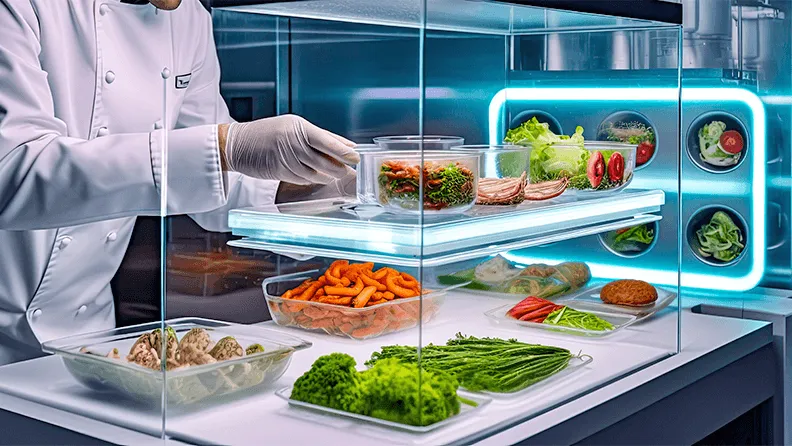
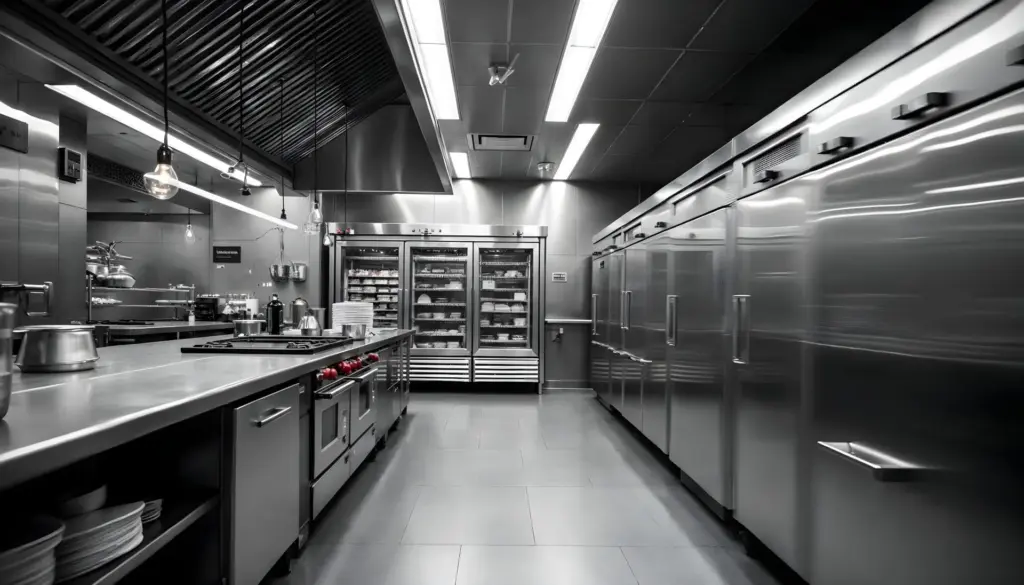
Integration of premium technology in the gourmet kitchen
Advanced precision and control
- Premium technology enables accurate management of critical parameters such as temperature, humidity and ventilation, ensuring that each ingredient retains its organoleptic qualities and reaches its optimum ripening or serving point. Equipment such as ripening cabinets and refrigerated cellars use digital control and remote monitoring systems to maintain ideal conditions at all times.
Automation and efficiency
- Automation, through robots and intelligent systems, has revolutionised the gourmet kitchen by taking over repetitive and precision tasks, freeing chefs to focus on creativity and presentation. Centralised systems allow all equipment to be controlled from a single interface, optimising management and improving operational efficiency.
Multifunctionality and flexibility
- Premium equipment tends to be multifunctional and modular, allowing chefs to adapt the kitchen to different needs and maximise space. Combi ovens, cooking robots and reconfigurable modules are examples of how premium technology brings flexibility and versatility to gourmet environments.
Innovation in sensory experience
- Technologies such as 3D food printing enable the creation of customised shapes, textures and nutritional compositions, opening up new possibilities in the presentation and personalisation of gourmet dishes. In addition, augmented and virtual reality is used to enrich the dining experience, integrating visual narratives and historical contexts into the tasting experience.
Sustainability and energy efficiency
- Premium equipment incorporates hygienic materials, natural refrigerants and energy efficient systems, aligning with environmental regulations and contributing to the sustainability of the gourmet business.1.
Product transformation and optimisation
- Beyond preservation, premium technology transforms and optimises products, allowing processes such as Dry Aged meat maturation or the controlled drying of sausages, raising the quality and final value of the gourmet product.1.
The integration of premium technology in the gourmet kitchen not only improves efficiency and quality, but redefines the dining experience, enabling chefs and businesses to offer innovative, sustainable and highly valued offerings to discerning customers.
Frequently asked questions when assessing design and technology
Does exposed design affect thermal efficiency?
No. Thanks to materials such as low-emission glass and triple-chambered doors with inert gas, Coreco equipment maintains thermal performance with maximum visibility.
How does the F-Gas regulation affect long-term investment?
Complying with F-Gas 2024 today ensures more durable, sustainable and future-compliant equipment, avoiding retrofitting costs.
What if I want to integrate the equipment into a space with a specific aesthetic?
Coreco models are designed to fit into premium spaces without altering their visual style. And they can be customised in some finishes.
What is the estimated lifetime of this equipment?
With proper maintenance, Coreco equipment has an operational life of well over 10 years, with low costs and high reliability.
Premium industrial cooling as a silent luxury piece of equipment
Today, gastronomic excellence is not improvised. It is designed. It is controlled. It is communicated. And in this new paradigm, industrial refrigeration has ceased to be a secondary actor and has become an invisible protagonist... but a crucial one.
The new luxury is not ostentatious. It is precise, sustainable and sensory. And it starts on the inside.
At Coreco Gourmet we design equipment that not only preserves the product. They preserve our clients' reputations. And elevate it.
If you are a distributor: sales arguments to close more deals
In the gourmet Horeca sector, the role of the distributor is no longer just to supply equipment. Today you are expected to act as a technical advisor and brand ambassador. Your customers - from chefs to architects to purchasing managers - are looking for more than a display cabinet: they want safety, efficiency, design and cost-effectiveness. Here are the key arguments you can use to make Coreco Gourmet display cabinets and cabinets stand out from other options on the market.
🔷 1. Converts technical features into concrete benefits
The most common mistake in technical sales is to recite specifications without translating them into real value for the customer. In the Horeca channel, every detail must be aligned with a tangible improvement: lower cost, higher perceived quality or greater operational ease.
Here are some examples for your sales pitch:
| Technical characteristics | Benefit for your client |
|---|---|
| Natural refrigerant R290 or R600a | Complies with F-Gas 2024, avoids penalties and reduces CO₂ |
| Low-emission triple glazing | Visibility without condensation = more attractiveness in the room |
| Master Ageing Controller | Tenderer meat, less shrinkage, higher profitability |
| Fanless cooling | Less noise = perfect for experience rooms |
| AISI-304 steel and professional finishes | Long-lasting hygiene and maintenance-free premium aesthetics |
| Warm spectrum LED lighting | Enhances product colour and texture, improves saleability |
| Digital remote control and WiFi (optional) | Accurate monitoring for chefs and multi-level chains |
